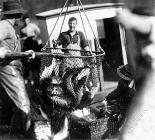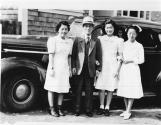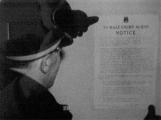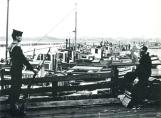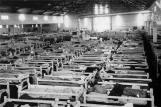14
My father was in charge of the fleet of fishing boats for the Anderson Fishing Cannery. He built boats, both fishing boats and pleasure boats but his living was in maintaining the cannery fleet. My father loved the white lilies, so our three boats were named White Lily 1, White Lily 2 and White Lily 3. They were trolling boats. He fished only to take us out for the fun of fishing (We loved those outings), or to bring home salmon for the table. He had a fishing license but he had no time to fish commercially.16
There was one other family of Japanese descent on the island but they lived on the otherside of the bay. We would see them but their lives were with the fishermen and our lives were with our neighbours. My friends were all Caucasians, Father's and Mother's too. Quadra Islanders didn't discriminate. They treated us royally. I was treated royally at school too, although that might have been because I was a good student.17
SCHOOLI went to Quadra Island Elementary School for only 4 years before I had finished grade 8. I was active and belonged to many clubs. In the off season, we went down to Vancouver; my parents rented a place there so that I could go to school. I attended King Edward High School. It was the original UBC. All the staff (about 80 - 100) were Ph.D.'s, waiting transfer to university. Years after the present UBC was established, King Edward High School continued to have Ph. D.'s waiting for appointment to UBC. Dr. Mawdsley, who became dean of women at UBC used to bring me senior matriculation papers to work on when I was still in Grade 12. I took academic courses as well as commercial courses and home economics. I was active in many clubs: student council; the year book; cheerleader; arts club; gymnastics; tennis and French Club. It seems that I was always on the go. I had so much energy. Dr. Mawdsley looked me up, when I went to UBC after the war, and took me to lunch at the Faculty Club several times. I was lucky and grateful that she remembered me.
19
(Dr. Shimotakahara, a nurse and 2 nurses aids)I WAS WORKING TOWARDS BECOMING A DOCTOR
I had always wanted to become a doctor or a missionary or a teacher. I wanted to get my MD and practice medicine in BC. In BC, at that time, persons of Japanese descent couldn't become teachers or pharmacists but they could become doctors. During the summer and every holiday I worked for a doctor. He spent a lot of time with me, giving me medical books and nursing books to study. He allowed me to take all the medical patients' records. Before they went to see the doctor, I took their blood pressure, blood tests, their history and present complaints. He taught me and let me do all the intravenous work. After interviewing each patient before they went to see the doctor he would ask for my "diagnosis", to test me I suppose. I would give him my opinion. He was pleased with my observations. Evidently I was pretty good. He thought I had a natural gift for medicine. I worked in his office and also went on house calls with him. I received great training as I worked in that office and studied his books. I really wanted to go on to medical school - but Pearl Harbour intervened and my dreams had to be put on hold.
21
At the time that I was completing high school and working for Dr. Shimotakahara, my parents were on Quadra Island - Father's workplace.23
KIMIMy older sister Kimi was torn away from us because of the war. She went to Japan and was marooned; that sounds funny, marooned. In 1939 my father's oldest brother, who was a priest, had diabetes and subsequently suffered a stroke. He wanted to return to Japan. His oldest son was in Osaka, at University and he asked, "Would you please bring father back home?" My father's brothers talked it over and they decided Kimi should be the one. My uncles didn't have any daughters and uncle needed care. Kimi took him back to Osaka. In 1941, she returned to Canada on a ship from Japan but it was not allowed to land. All the people on board were prevented from disembarking. The fact that she was born in Canada didn't matter. The ship attempted to land in Seattle and was also turned away. Finally the ship had to return to Japan without discharging the passengers.
Kimi lived with my mother's brother in Japan. She was coming to be 21 and the war had started. Our uncle thought, "I have to be a judicious parent; I've got to see that she is married." He introduced her to a young man whose mother had gone to finishing school with my mother when she was in Japan. She protested, "No I can't get married here. I must go back to Canada." At that time no one knew what the outcome of the war would be. The war could be a hundred years' war. This dragged on and on. We had no word. They wouldn't allow any mail to come through. Mother and Father were frantic trying to contact her and she was trying to contact us through the League of Nations and the International Red Cross but with no success.
Years passed and we had no idea what had happened to her, nor did she know what had happened to us. Uncle finally told her that she had to get married, and set up her own home. She was married, unwillingly. She still wanted to return to Canada. She worried about Mother and Father and my little brother. As the oldest, she, of course, felt responsible for us. The man she married was a nice man but he was an only son. He wouldn't be able to leave even after the war as he would have to keep up the family place. She lost her first baby with the stress. Then there was the atomic bomb and still we didn't know what had happened to her. After the war she visited us twice but she always had to go back.
25
WAR"An RCMP officer came to the door of my parents' home the day after Pearl Harbour, and Father was ordered to take his three boats to New Westminister. In March 1942, they told Mother and Father to pack only enough to be away for three months; then they could return. They were to be on the Union Steamship for Vancouver the next day."
26
A neighbor from Quadra Island phoned to tell me that Father and Mother were being sent to Vancouver by Chelosin (Union Steamship). They had been sent off with wishes of "come back soon" and bouquets of flowers. It was a 12 hour trip at that time. I went down to meet them at the dock and saw my mother at the head of the gangplank carrying a bouquet of flowers. She looked like a bride. At the bottom of the gangplank, along with others of Japanese descent, they were herded into vans and taken away. I had not been allowed to speak to them and I didn't know where they were being taken.They were among the first Nikkei (Port Alice, Campbell River and Quadra Island) to be removed from their homes. No one knew what was happening.
